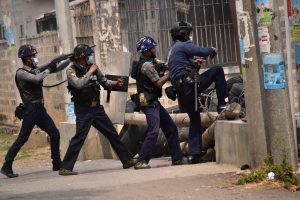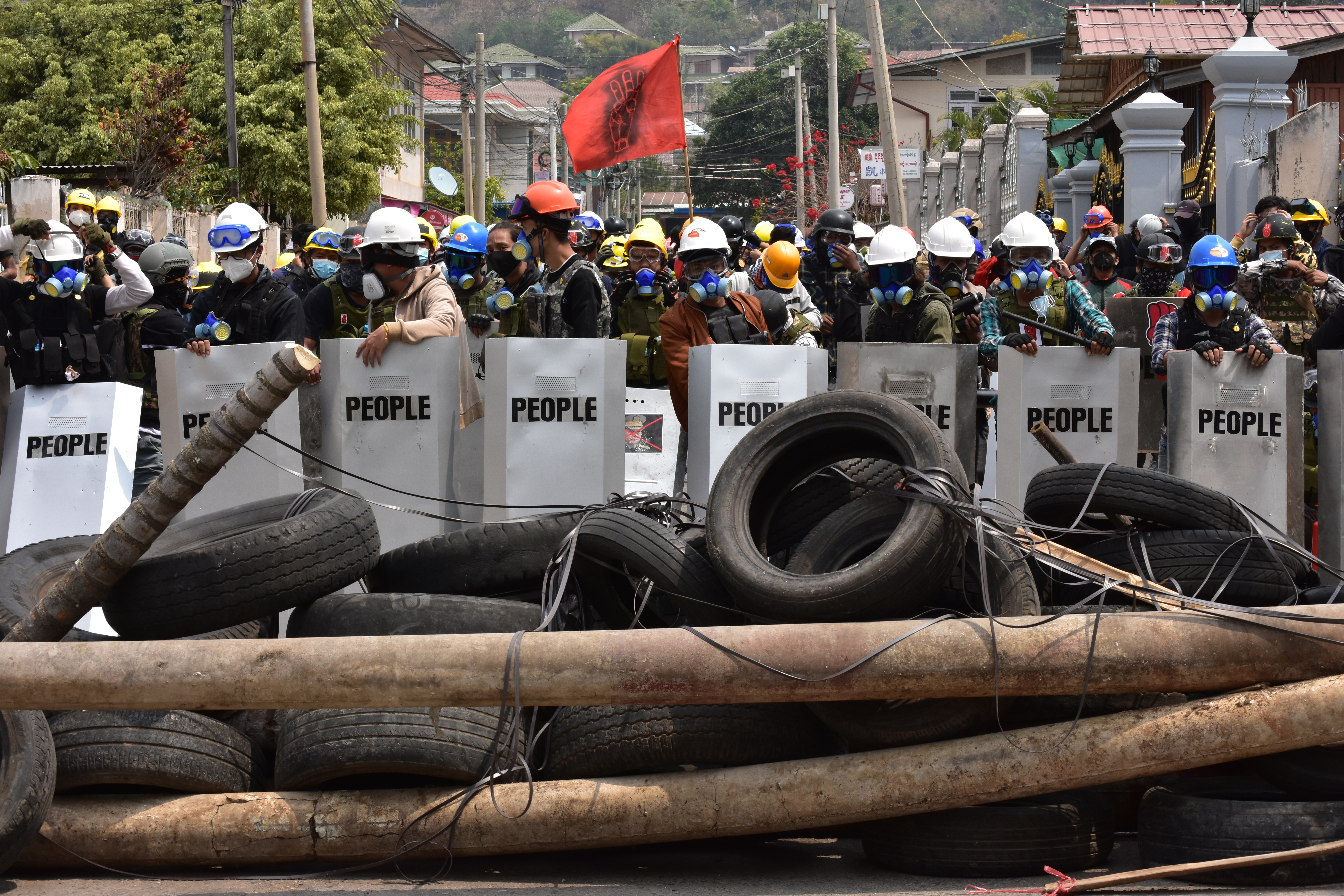Nine months after the military coup, Myanmar’s National Unity Government (NUG), which stands in opposition to the junta, has declared the formation of a command structure to coordinate between civilian resistance forces and allied ethnic armed organizations (EAOs).
Before that, many members of the People’s Defense Force (PDF), a grouping of 300 armed organizations formed by the pro-democracy fighters, had reported lack of adequate weapons and commanders.
Phyo Z., one of many young people that received training in the north of the country from the Kachin Independence Army (KIA), had said that he and his colleagues “themselves were drafting the guerrilla strategy” for the surrounding area in the town of Homalin in the Sagain Division. Phyo Z. said his group was waiting for the NUG to provide more resources, including weapons.
In a written response to The Diplomat, Naing Htoo Aung, the secretary of the NUG’s Ministry of Defense (MoD), said that the MoD began to encourage the armed groups to follow its code of conduct in return for a promise to support them. Yet upon taking up a more active role in governing the groups, “it turned out that some of them did not exist outside of Facebook, or did not have enough manpower to form an armed group,” he said. In addition, some groups were actually fronts by the military or military supporters to trace and track other local PDFs.
Now, Naing Htoo Aung said, “if we consider numerically, nearly two-third of local PDFs are under our command.”
The aim of the new command structure was to control the spread of arms and weaponry in the country “before it becomes problematic.”
The country has experienced bomb and mine blasts in various locations, often near government offices. In some cases, passing civilians have been injured in these attacks.
Not everyone is fond of tactics deployed by the resistance movement.
The “PDF is worse than the Tatmadaw,” argued Zar Oo, a teacher from Yangon who has a husband teaching in the armed forces. “They kill civilians who disagree with them.” She and other people, dissatisfied with the National League for Democracy (NLD), are currently silenced by the threat of violence.
However, there are also those who seek to unseat the Myanmar army without taking up arms.
“I could not watch police and military brutally cracking down on protesters, so I joined the Civil Disobedience Movement (CDM),” Captain Nyi Thuta said in an interview. Nyi Thuta decided to defect from the army, a move that put him and his family at risk.
Together with other defected soldiers, “I realized that the defection strategy is the least violent strategy to defeat the junta,” he added.
For this purpose, Nyi Thuta created a non-military organization, People’s Soldiers, to assist security force officers that plan to defect.
“Our efforts have resulted in over 2,000 defections so far,” he claimed. In addition, some soldiers sympathetic to the cause are said to remain in the Tatmadaw to serve as informants.
“We get hundreds of calls each week asking us for assistance” in defecting, Nyi Thuta claimed. “After we do some investigations of the person’s background, we start the planning process for his escape.”
The whole process is, however, constrained by security threats, as the team must be careful of military spies.
In addition to the People’s Soldiers, there is also another group of defectors, called People’s Embrace, that claims to have facilitated the defections of another group of 2,000 security forces personnel. Unlike People’s Embrace, the People’s Soldiers group is not run by the NUG, although they are in contact.
Generation Z calls soldiers who are planning to defect “watermelons,” which is a reflection of the dark humor the protest movement must have in order to survive. Green skin of the fruit recalls the color of the military uniform, while the red flesh inside is the color of the National League for Democracy.
Captain Nyi Thuta comes from a military family and graduated from the military academy in 2010, the same time when Myanmar embarked on the path of democratic transition.
“We were so full of hopes and dreams,” he said. “I had a dream to be a part of a professional military organization that protects its citizens.”
At that time, several foreign governments offered Myanmar help in modernizing its army, in hopes of furthering the political change. Tatmadaw officers took part in events sponsored by the Asia-Pacific Center for Security Studies in Hawaii and the U.S. Defense Institute for International Legal Studies. Australia’s government likewise restored its defense ties with Myanmar, cooperating in areas such as peacekeeping, humanitarian assistance, and disaster relief.
But all these hopes were overturned by the military’s decision to seize power on February 1. Myanmar protesters call it a “failed coup,” as the generals have been unable to get full control of the country since.
Since the onset of the coup, the junta forces have killed more than 1,240 people, and numerous accounts of torture have emerged across the country. More than 7,000 people have been arrested for resisting the junta. The recently announced release of 5,000 detainees was followed by the rearresting of over 1,000, often within a few hours.
As a part of his activities, Nyi Thuta conducts regular live-streaming sessions in which “soldiers talk about why they left the military” to rebuild trust and show the humanity of the defectors to the people.
Importantly for the resistance movement, the military junta has been facing difficulties in recruiting soldiers. For the first time in history, the Tatmadaw failed to fill the new class of Defense Services Academy.
To fix the personnel shortage, in some instances they have “forcefully drafted wives and children of the soldiers and [began] arming them,” Nyi Thuta reported. Also, he said, retired veterans are being drafted back into service.
Nyi Thuta argues that because of the high rate of defections, thousands being killed on the battlefield, as well as COVID-19-related deaths, “the military’s long-term viability is in question for the first time in history.”
Many defectors claim that “the soldiers are now really tired and demoralized.” Some are counting on a split within the military that would shake the institution more gravely. Recently, it was reported that the regional commander of Tatmadaw’s North-West Division was arrested for planning to break away.
Despite these hopes, new waves of Tatmadaw troops are continuously being sent to locations showing signs of resistance.
“However, we have made progress,” the NUG’s Naing Htoo Aung told The Diplomat, pointing to the resistance in the Sagaing region, Magway region and Kayah state. “The junta is unable to control these areas anymore.”
Also, Naing Htoo Aung added that “some administrative institutions have been established by the NUG” in places with the highest number of defected policemen.
On September 7, the NUG declared a state of emergency as well as a defensive war, which was dubbed by the media as D-Day. But the MoD stressed that the declaration was “not for the military means only.” Therefore, Naing Htoo Aung argued, “it would be difficult to measure the progress by the outcomes of military means alone.”
“Every single mean of resistance is supportive to take the junta down,” he said.
However, in the rushed process of destabilizing the regime, there must be serious efforts to not let these organizations become a hideout for those of guilty conscience seeking to flee a sinking ship.
While Captain Nyi Thuta is confident that almost all of the soldiers he helps did not commit any crimes against the civilian population, the MoD takes a more cautious position, saying, “anyone must be responsible and accountable for their actions.” At this moment, the shadow government is drafting plans for what they call “transitional justice,” which is said to be supported by local and international organizations.
Another issue for justice and accountability is that some of the ethnic armed groups whose support the NUG relies on to build the united front are infamous for human rights abuses, such as forced recruitment, forced labor, money extortion, and restricting women’s rights.
“The ethnic armed groups with many years of experience in armed resistance [are] crucial in this resistance movement,” Nyi Thuta said, by way of justifying their inclusion. He pointed to the NUG’s promise to establish a genuine federal system upon its victory.
A new Myanmar is very hard to imagine for many in the country and abroad. Yet many members of the resistance movement remain adamant, envisioning that their revolution will sweep the Tatmadaw away once and for all.
On the other hand, international actors, such as the EU and U.S., have repeated that both the generals and the protest movement – including but not limited to the members of the NUG – must come together and establish a peaceful dialogue.
However, protesters cannot imagine a future Myanmar in which the Tatmadaw would continue to exist. Some suggest that the new armed forces should not be even named “Tatmadaw,” a name derived from the country’s royal past.
“As the Tatmadaw’s standing in the society is at the lowest possible level, the generals will be drafting the plans to save themselves from the total collapse,” argued Aung Htoo, previously an active street protester. “If someone brings out [a democratic] transition again from [the Tatmadaw], we will not buy it again.”
The country has been excluded from participation in the ASEAN, yet the junta remains the holder of vast resources that keep it alive. It is reported that the junta still have access to $5.7 billion in currency reserves through many channels. In the meantime, Myanmar’s currency has depreciated over 60 percent making life hard both for civilians and military personnel.
The final battle is yet to be waged, but external actors cannot look away from their responsibilities. At the same time, Myanmar’s society is forced to construct bridges that will overcome new and old hurdles in building a just society.


































